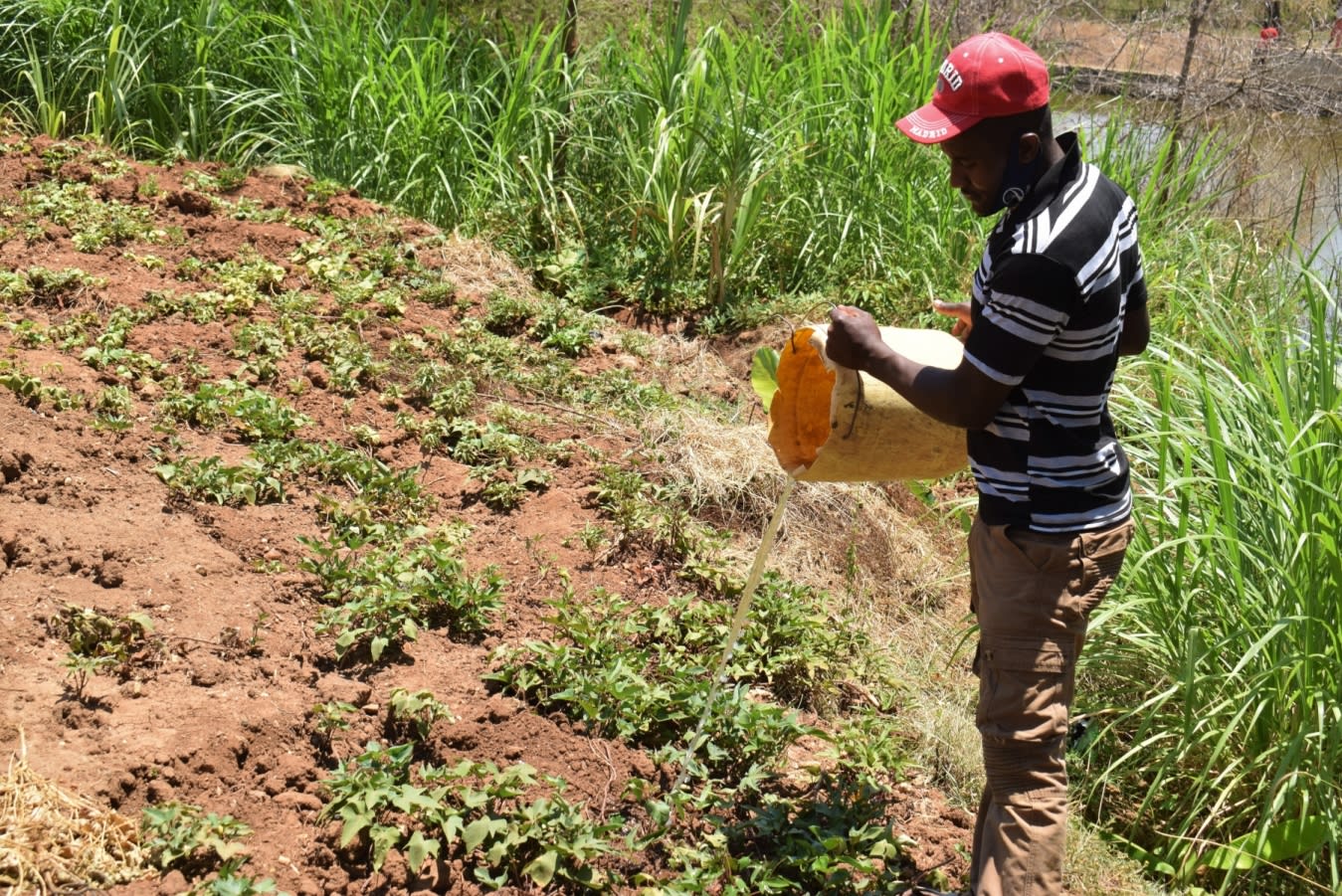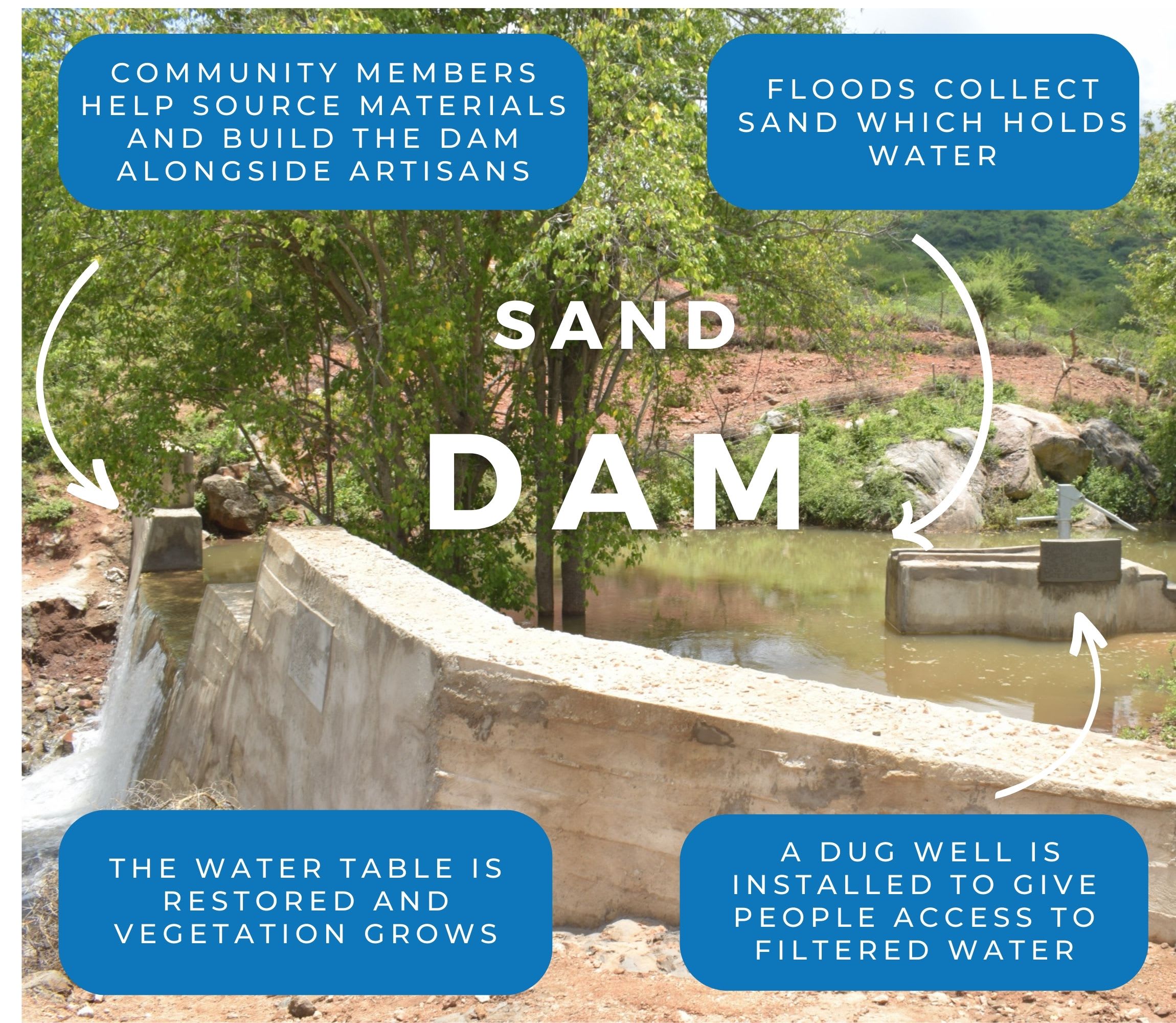Project Updates
December, 2020: Through Their Eyes: COVID-19 Chronicles with Justin Mbila
This post is part of a new series by The Water Project meant to highlight the perspectives and experiences of the people we serve and how the COVID-19 pandemic is impacting them. We invite you to read more of their stories here.
Our team recently visited Kithumba to conduct COVID-19 prevention training and monitor their water point. Shortly after, we returned to check in on the community, offer a COVID-19 refresher training, and ask how the pandemic affects their lives.

During this most recent visit, Justin Mbila shared her story of how the coronavirus impacts her life and her community.
Field Officer Lilian Kendi met Justin outside her home to conduct the interview. Both Lilian and Justin observed physical distancing and other precautions throughout the visit to ensure their health and safety. The following is Justin's story in her own words.

What is one thing that has changed in your community since the completion of the water project?
Water is readily available. We no longer go to fetch water far from our homes. Community members are enjoying a surplus supply of water, which they can fetch at any time of the day. We can plant trees and get vegetables easily here at our farms instead of buying them as we used to.
How has having a clean water point helped you through the pandemic so far?
Having a clean water point has helped us a lot in that we fetch water nearer to our homes at no cost and at any time of the day. We use the water for cleaning, bathing, washing our hands frequently and for cooking at our homes.

Since the outbreak of COVID-19 in Kenya, has fetching water changed for you because of restrictions, new rules, or your concerns about the virus?
Yes, fetching water has changed for me. Now, I have to observe social distancing whenever I find another person fetching water at the well. I ensure I wear a mask to protect myself against contracting the virus, and I also wash my hands before and after using the hand pump.
How has COVID-19 impacted your family?
My family was affected because my husband worked as a teacher, and the schools have been closed ever since the onset of the virus. My children have not been going to school—also, the businesses I often engaged in started underperforming. The seasons of selling fruits were disrupted because there were no customers. So the fruit spoiled at the farm.
What other challenges are you experiencing due to the COVID-19 pandemic?
We have experienced harsh economic impacts due to the halt of our businesses. Income-generating activities that we highly relied on are not performing very well due to the unstable economy. Our children no longer go to school as they used to due to the closure of schools.

What hygiene and sanitation steps have you and your community has taken to stop the spread of the virus?
We reduced the visitations we had. Each member now stays at their homes as we are all scared of contracting the virus. We practice social distancing whenever we are out in public. We ensure we wash our hands frequently with soap and clean water.
Like most governments worldwide, the Kenyan government continues to set and adjust restrictions both nationally and regionally to help control the spread of the virus.
What restriction were you most excited to see lifted already?
The cessation of movement was removed, and now we can easily interact with our family members and move from one town to another to conduct business. The lift on the ban of age restriction while attending church was a relief as we could interact with fellow worshippers. The adults are now able to advise the young ones and teach them the right ways.
What restriction are you still looking forward to being lifted?
Opening of schools for all classes so that my children can get back to learning.
When asked where she receives information about COVID-19, Justin listed the radio and our team's sensitization training.
What has been the most valuable part of the COVID-19 sensitization training you received from our team?
We were taught how to prepare soap to prepare it easily at our homes instead of buying and ensuring we wash our hands with soap and clean water.
How has getting food been at this time?
We did not strain a lot in getting food because we had food from our farms. The only challenge was purchasing food from retail shops as we had insufficient money.

October, 2020: Through Their Eyes: COVID-19 Chronicles with Matthew Mulandi
This post is part of a new series by The Water Project meant to highlight the perspectives and experiences of the people we serve and how the COVID-19 pandemic is impacting them. We invite you to read more of their stories here.

Matthew Mulandi and his family.
Our team recently visited Kithumba community to conduct a COVID-19 prevention training and monitor their well and dam. Shortly after, we returned to check in on the community, offer a COVID-19 refresher training, and ask how the pandemic affects their lives.
During this most recent visit, Matthew Mulandi shared his story of how the coronavirus is impacting her life and his community.
Field Officer Lilian Kendi met Matthew outside his home to conduct the interview. Both Lilian and Matthew observed physical distancing and other precautions throughout the visit to ensure their health and safety. The following is Matthew's story, in his own words.
What is one thing that has changed in your community since the completion of the water project?
"A lot has changed since the installation of this water point. We have plenty of water to plant trees and vegetables such as kales, spinach, onions, and tomatoes for domestic use at our homes and sale. Generally, farming projects have intensified thanks to this water project. Community members no longer have to walk for long distances to fetch water. This has enabled them to save more time to engage in other income-generating activities."
How has having a clean water point helped you through the pandemic so far?
"Having a clean water point has helped us provide water for drinking, bathing, washing clothes, and other household uses at our homes."

Since the outbreak of COVID-19 in Kenya, has fetching water changed for you because of restrictions, new rules, or your concerns about the virus?
"Yes, a lot has changed for me since the outbreak of COVID-19. Following the restrictions provided by the government, I have had to practice handwashing before and after using the shallow well's hand pump, observe social distancing at the well to avoid contact, and wear a mask whenever I leave the house to go and fetch water."
How has COVID-19 impacted your family?
"The economy has become unstable since the onset of the virus. Casual labor jobs are not well paying as they were before, which has reduced the income earned at the household level. I had to send my wife and family to live with the extended family at my matrimonial home due to the changing times as I could not provide for them as consistently as I did before."
What other challenges are you experiencing due to the COVID-19 pandemic?
"Our income is unstable due to the lack of jobs. The economy is still rocky hence making it hard for us to engage in businesses as usual. My daughter was to join school this year, but that is not possible due to its closure."

Matthew watering his farm with water from the well.
What hygiene and sanitation steps have you and your community has taken to stop the spread of the virus?
"We took the following hygiene and sanitation steps to stop the virus: wearing masks, social distancing, washing hands with soap and clean water, and avoiding crowded places."
Like most governments worldwide, the Kenyan government continues to set and adjust restrictions both nationally and regionally to help control the spread of the virus.
What restriction were you most excited to see lifted already?
"There were age restrictions set when going to church, but they have been lifted, which has allowed all age groups to attend church. The elderly can now provide counsel to the young generation. The opening of the marketplace has allowed businesses to start picking up gradually."

Matthew Mulandi
What restriction are you still looking forward to being lifted?
"I look forward to the opening of schools so that my daughter can officially join pre-school."
When asked where he receives information about COVID-19, Matthew listed the radio and our team's sensitization training.
What has been the most valuable part of the COVID-19 sensitization training you received from our team?
"Through this sensitization training, I learned the importance of handwashing at all times, social distancing, and proper hygiene and sanitation."

May, 2020: COVID-19 Prevention Training Update at Kithumba Community
Our teams are working on the frontlines of the COVID-19 pandemic. Join us in our fight against the virus while maintaining access to clean, reliable water.

We are carrying out awareness and prevention trainings on the virus in every community we serve. Very often, our teams are the first (and only) to bring news and information of the virus to rural communities like Kithumba, Kenya.
We trained community members on the symptoms, transmission routes, and prevention of COVID-19.
Before there were any reported cases in the area, we worked with trusted community leaders and the Water User Committee to gather community members for the training. At the time, social distancing was a new concept and one that challenges cultural norms. Although community members were hesitant to adopt social distancing during the training, we sensitized them on its importance and effectiveness in combating the spread of the virus
We covered essential hygiene lessons:
- Demonstrations on how to build a simple handwashing station
- Proper handwashing technique
- The importance of using soap and clean water for handwashing
- Cleaning and disinfecting commonly touched surfaces including at the water point.

We covered COVID-19-specific guidance in line with national and international standards:
- Information on the symptoms and transmission routes of COVID-19
- What social distancing is and how to practice it
- How to cough into an elbow
- Alternative ways to greet people without handshakes, fist bumps, etc.
- How to make and properly wear a facemask.

During training, we installed a new handwashing station with soap near the community’s water point.
Due to the rampant spread of misinformation about COVID-19, we also dedicated time to a question and answer session to help debunk rumors about the disease and provide extra information where needed.
Water access, sanitation, and hygiene are at the crux of disease prevention. You can directly support our work on the frontlines of COVID-19 prevention in all of the communities we serve while maintaining their access to safe, clean, and reliable water.

October, 2019: Giving Update: Kithumba Community Sand Dam
A year ago, your generous donation helped Kithumba Community in Kenya access clean water.
There’s an incredible community of monthly donors who have come alongside you in supporting clean water in Kithumba. Month after month, their giving supports ongoing sustainability programs that help this community maintain access to safe, reliable water. Read more…

February, 2019: Kithumba Community Sand Dam Complete
Kithumba Community, Kenya now has a new source of water thanks to your donation. A new dam was constructed on the riverbed, which will build up sand to raise the water table and naturally filter water. Community members also attended hygiene and sanitation training, and plan to share what they learned with their families and neighbors.
Training Review and New Knowledge
Matiliku region field officer Jeff Maluki mobilized community members to attend the training. All community members were invited and the date shared in time for the trainers to prepare. The weather ended up being cold and rainy. The homestead we met at luckily had a a shelter that provided enough cover for the participants.

Participants asked us to review water treatment, latrine hygiene, handwashing, and soap-making.
We took them through various methods of treating drinking water. They were also taken through how water contamination can be prevented at each point in the water chain.
The participants also brought some materials so that we could review soap-making with them. They provided water, a big basin, and a stirring rod. We provided the soap-making ingredients - enough to make 60 liters of soap.

Mixing soap
Everyone was interested in learning the whole process and they were patient until the final product was obtained. The group took turns stirring the liquid soap. The participants pointed out that the soap is high quality compared to what is currently on the market, and that the whole process is simple and easy to follow.
"The training was good and I have learned a lot," said Mr. Muinde.
"I have learned about water treatment methods and this will help me to prevent waterborne diseases. The soap-making training will enable me to improve hygiene and sanitation at home since the soap is of good quality and affordable."
Sand Dam
"This project is a big boost to the water challenges in our village," said Mrs. Kavinya.
"It will bring water close to our homesteads, thus reducing the distances covered in search of the valuable commodity. We are happy to have completed the project and for seeing the work of our hands yielding fruits in getting water. We will use the available water resources to improve on our agriculture and also cleanliness standards at the household levels."

The Process:
The community members collected all of the local materials like rocks and sand that were required for successful completion of the dam. They also provided unskilled labor to support our artisans. The collection of raw construction materials takes longer than the actual construction. For a super large sand dam, materials collection could take up to four months.

Community members brought materials like stone and sand to the construction site while we brought cement, rebar, lumber, and heavy-duty tools.
Siting and technical designs were drawn and presented to the Water Resources Management Authority and a survey sent to the National Environment Management Authority for approval before construction started. Once approved, we established a firm bedrock at the base of the sand dam wall. In the absence of good bedrock, excavation is done up to a depth at which the technical team is satisfied that the ground is firm enough to stop seepage.

Then mortar (a mixture of sand, cement, and water) is mixed and heaped into the foundation. Rocks are heaped into the mortar once there is enough to hold. Barbed wire and twisted bar are used to reinforce the mixture. Once the foundation is complete, a skeleton of timber is built to hold the sludge and rocks up above ground level. The process is then repeated until a sufficient height, width and length are built up. The vertical timber beams are dismantled and the dam is left to cure.

As soon as it rains, the dam will begin to build up sand and store water. With this water, the surrounding landscape will become lush and fertile.
It could take up to three years of rain (because sometimes it only rains once a year!) for this sand dam to reach maximum capacity. It is 31.3 meters long and 5 meters high and took 432 bags of cement to build.
Sand dam construction was undertaken simultaneously with the construction of a hand-dug well that will give community members a safe method of drawing water. As the sand dam matures and stores more sand, a huge supply of water will be available for drinking from the adjacent hand-dug well.
To see that hand-dug well, click here.

January, 2019: Kithumba Community Sand Dam Underway
Kithumba is an expansive community built over arid, sandy land. Many people have to walk miles just to find water!
A sand dam built on a nearby dry riverbed will capture tons of rainwater that will outlast the dry, rainless months of the year. Thanks to your generosity, water access will drastically improve for hundreds more people living in Kithumba.
Check out the project page to learn more about this community, the sand dam we'll build, and the training that the community will attend. We look forward to reaching out soon with news of success!


 Sand Dam
Sand Dam
 Rehabilitation Project
Rehabilitation Project











































